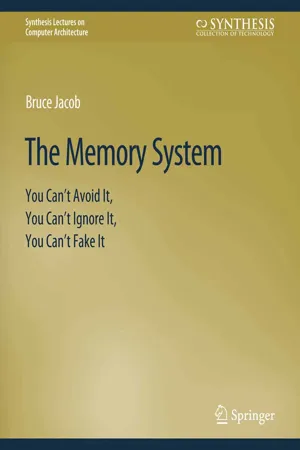
- English
- PDF
- Available on iOS & Android
eBook - PDF
About this book
Today, computer-system optimization, at both the hardware and software levels, must consider the details of the memory system in its analysis; failing to do so yields systems that are increasingly inefficient as those systems become more complex. This lecture seeks to introduce the reader to the most important details of the memory system; it targets both computer scientists and computer engineers in industry and in academia. Roughly speaking, computer scientists are the users of the memory system and computer engineers are the designers of the memory system. Both can benefit tremendously from a basic understanding of how the memory system really works: the computer scientist will be better equipped to create algorithms that perform well and the computer engineer will be better equipped to design systems that approach the optimal, given the resource limitations. Currently, there is consensus among architecture researchers that the memory system is "the bottleneck," and this consensus has held for over a decade. Somewhat inexplicably, most of the research in the field is still directed toward improving the CPU to better tolerate a slow memory system, as opposed to addressing the weaknesses of the memory system directly. This lecture should get the bulk of the computer science and computer engineering population up the steep part of the learning curve. Not every CS/CE researcher/developer needs to do work in the memory system, but, just as a carpenter can do his job more efficiently if he knows a little of architecture, and an architect can do his job more efficiently if he knows a little of carpentry, giving the CS/CE worlds better intuition about the memory system should help them build better systems, both software and hardware. Table of Contents: Primers / It Must Be Modeled Accurately / ...\ and It Will Change Soon
Frequently asked questions
Yes, you can cancel anytime from the Subscription tab in your account settings on the Perlego website. Your subscription will stay active until the end of your current billing period. Learn how to cancel your subscription.
No, books cannot be downloaded as external files, such as PDFs, for use outside of Perlego. However, you can download books within the Perlego app for offline reading on mobile or tablet. Learn more here.
Perlego offers two plans: Essential and Complete
- Essential is ideal for learners and professionals who enjoy exploring a wide range of subjects. Access the Essential Library with 800,000+ trusted titles and best-sellers across business, personal growth, and the humanities. Includes unlimited reading time and Standard Read Aloud voice.
- Complete: Perfect for advanced learners and researchers needing full, unrestricted access. Unlock 1.4M+ books across hundreds of subjects, including academic and specialized titles. The Complete Plan also includes advanced features like Premium Read Aloud and Research Assistant.
We are an online textbook subscription service, where you can get access to an entire online library for less than the price of a single book per month. With over 1 million books across 1000+ topics, we’ve got you covered! Learn more here.
Look out for the read-aloud symbol on your next book to see if you can listen to it. The read-aloud tool reads text aloud for you, highlighting the text as it is being read. You can pause it, speed it up and slow it down. Learn more here.
Yes! You can use the Perlego app on both iOS or Android devices to read anytime, anywhere — even offline. Perfect for commutes or when you’re on the go.
Please note we cannot support devices running on iOS 13 and Android 7 or earlier. Learn more about using the app.
Please note we cannot support devices running on iOS 13 and Android 7 or earlier. Learn more about using the app.
Yes, you can access The Memory System by Bruce Jacob in PDF and/or ePUB format, as well as other popular books in Technology & Engineering & Systems Architecture. We have over one million books available in our catalogue for you to explore.
Information
Table of contents
- Cover
- Copyright Page
- Title Page
- Contents
- Prelude: Why Should I Care About the Memory System?
- Primers
- It Must Be Modeled Accurately
- ... and It Will Change Soon
- Postlude: You Can't Fake It
- Bibliography
- Biography